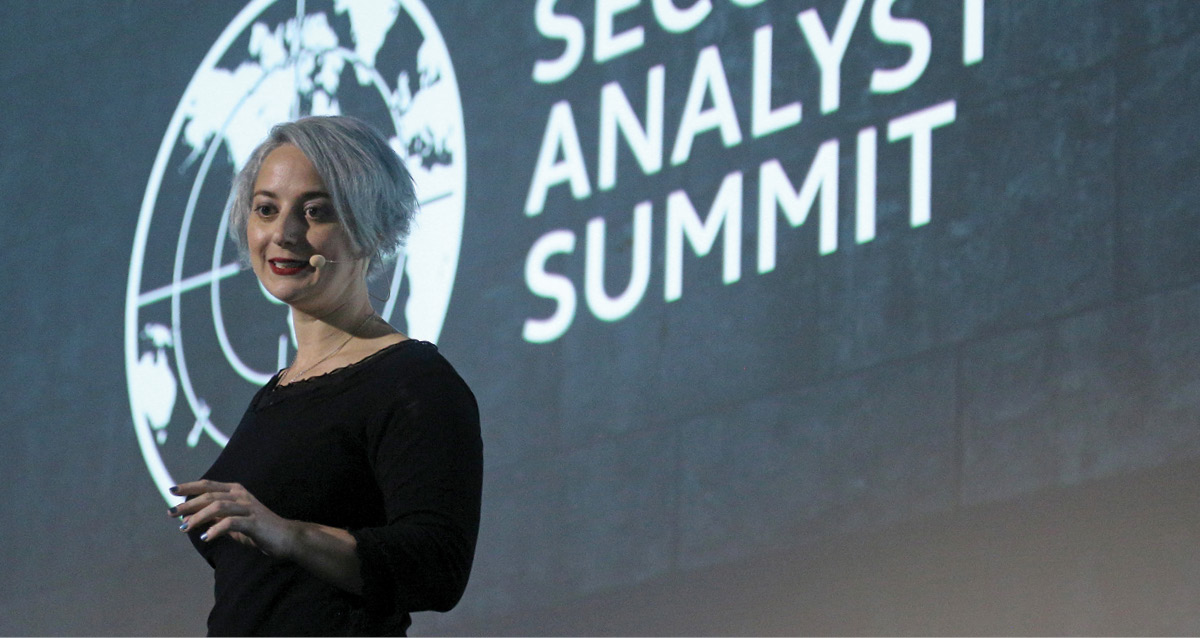
Blocking the Stalkers
On Jan. 28, 2018, Eva Galperin’s career took an unexpected turn. A noted security researcher leading the Threat Lab of San Francisco-based civil liberties organization the Electronic Frontier Foundation (EFF), Galperin (B.A., ’07) decided to offer her expertise to a very specific population.
“If you are a woman who has been sexually abused by a hacker who threatened to compromise your devices,” she wrote on Twitter, “contact me and I will make sure they are properly examined.”
That offer would be retweeted more than 10,000 times, and nearly two years later Galperin is still a very busy, very vocal advocate for victims of domestic abuse and sexual violence.
“I inadvertently started a large and complicated project,” she notes somewhat incredulously.
That project has seen Galperin work tirelessly to change the way anti-virus companies deal with “spouseware” — software designed to compromise devices and enable surveillance. Because the software, also known as stalkerware, has certain legitimate functions (such as allowing parents to monitor their children’s online activities) users were rarely alerted when it was running on their devices. That allowed harassers to steal data or keep watch on their victims’ activities.
“For a lot of this software, you need to have the user name and password or the Apple ID to install it on the device,” Galperin says. “What [the anti-virus companies] told me was, ‘If you have the user name and password for the device, that’s the same thing as having legitimate access for the device.’ I told them, ‘I have some news for you about how abuse works.’”
To date, three of the leading anti-virus companies have changed their spouseware policies thanks to Galperin’s efforts, and she’s still pushing others to do the same.
Galperin, who joined the EFF in 2007, was perhaps uniquely positioned to work on the spouseware issue, having devoted much of her time at the organization to studying internet censorship and the government use of malware to spy on activists, journalists and other vulnerable groups around the world. But her interest in computers dates to childhood. “I was raised by nerds,” Galperin says.
When she was just 3, Galperin emigrated from the then-Soviet Union to California with her family. Her mother got a job in biotech; her father pursued a career in computer engineering in Silicon Valley in the 1980s. (“It was extremely good timing,” Galperin says.) As a teenager, Galperin began working in UNIX systems administration “because I had learned it at home and it was an extremely portable skill.”
She used the money she made to put herself through college. Planning to become a lawyer, Galperin studied political science and international relations at SF State, even serving as president of the Pre-Law Society. But it was her participation in a different extracurricular activity that has since proved especially beneficial. “The single most useful thing that I got out of college was being part of the intercollegiate forensics team,” Galperin says. “Getting up in front of people and talking is what I do for a living.”
These days, she serves not only as the head of EFF’s Threat Lab but also as the organization’s director of cybersecurity, traveling the globe to teach classes on privacy and online security.
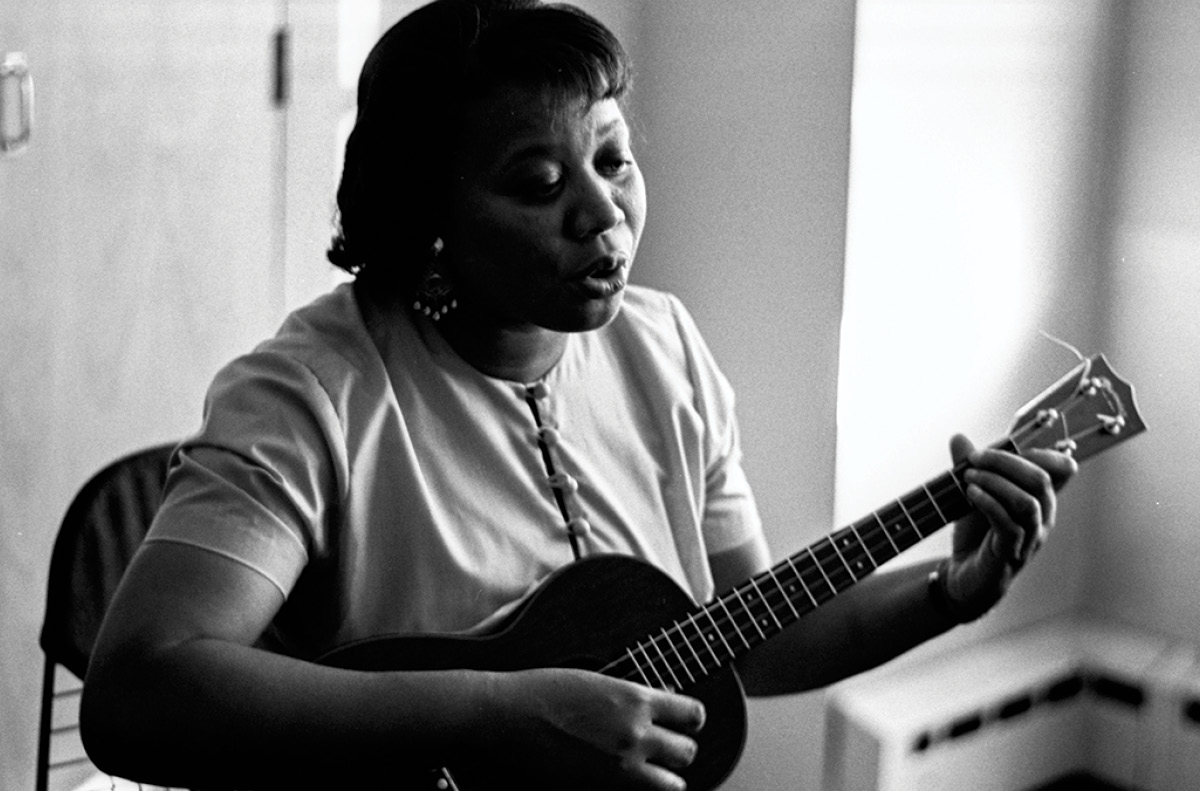
The Washington Post once wrote that Ella Jenkins (B.A., ’51) “is to children’s music what Ella Fitzgerald is to jazz and Pete Seeger is to folk.” But there’s another notable figure one could compare the folk singer to: the Energizer Bunny. Like that long-running marketing mascot, Jenkins keeps going and going and going. The nonagenarian’s latest album is Camp Songs with Ella Jenkins & Friends, and she still performs regularly (as she did at a “Celebration of Ella!!” tribute in Chicago earlier this year).
Jenkins wasn’t feeling well when she answered questions about her long career, which includes appearances on “Sesame Street” and “Mr. Rogers’ Neighborhood,” a Grammy Lifetime Achievement Award, and a spot in SF State’s Alumni Hall of Fame. But she perks up when asked whether it is her talent or her loving nature that allows her to connect with kids.
“Both!” she replies. “I enjoy children a great deal and I seem to relate to them very well, and they relate to me. They don’t seem to be afraid of me like they are afraid of lot of adults they don’t know.”
Born in St. Louis and raised there and in Chicago, Jenkins began to create songs for children while volunteering at a recreation center in the Windy City.
“I would try out different songs with them, and they liked them because they were call and response,” says Jenkins.
Despite that early indication that a career in children’s music could be in her future, Jenkins came to SF State to study sociology.
After graduating, Jenkins returned to Chicago, launching her career as a performer a few years later. Her proudest moment in the long career that followed came in 1966, when she released the single “You’ll Sing a Song and I’ll Sing a Song.” Today the beloved song is on the National Recording Registry, a list of sound recordings the Library of Congress deems “culturally, historically or aesthetically significant.”
“Many people have liked that song and recorded it,” Jenkins says. “I’m pleased that so many people responded to it.”
Michael Herz (M.A., ’62)
was awarded San Francisco Baykeeper’s Blue Rivet Award. The award honors “heroes who have made a significant contribution to the health of San Francisco Bay.” Founded by Herz 30 years ago, San Francisco Baykeeper stops polluters, monitors water health, educates the public and pushes for enforcement of environmental protection laws. Herz retired from the organization in 1995. This year Anchor Brewing Company honored its 30th anniversary with the introduction of a San Francisco Baykeeper India Pale Ale.
Bill Siverly (B.A., ’66; M.A., ’68)
published his fifth book of poems, “Steptoe Butte,” in 2013. He published his sixth book of poems, “Nightfall,” in 2018. Both books are from Windfall Press, a publishing imprint Siverly co-founded in 2002. Windfall Press also publishes “Windfall: A Journal of Poetry of Place,” which features poetry of the Pacific Northwest and appears twice yearly on the equinoxes. Siverly retired from teaching at Portland Community College in 1999.
Carol Blackman (B.A., ’69; Teaching Credential, ’70)
is the author of the nonfiction book “Truth and Love: Finding the Soul of the Sixties” (More to Say from SF, ’17), which includes a chapter on SF State.
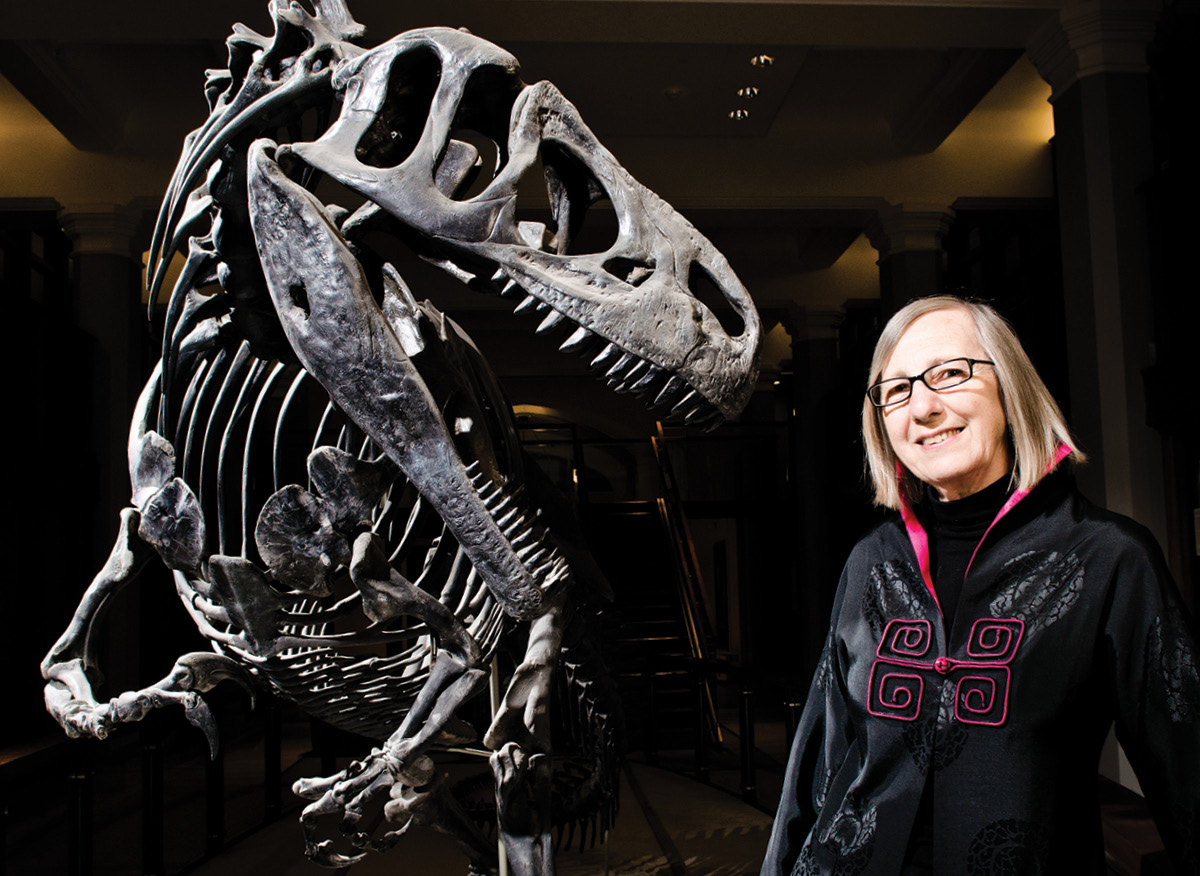
You probably know the story. Sixty-six million years ago, a giant asteroid smashed into Earth, wiping out the dinosaurs and clearing the way for our furry ancestors to thrive. Gerta Keller (B.S. ’73), a professor of geosciences at Princeton University, thinks that story is full of holes.
Since the idea was introduced in 1980, Keller has been a rare dissenting voice in the field of mass extinction research, and her geological detective work to determine the extinction’s true cause has taken her from northeastern Mexico to the site of ancient volcanoes in India.
Keller got her start in science at SF State, switching her major from anthropology to geology in search of a field where she could seek a more objective kind of truth (and some opportunities for travel). “I wanted to do research on mass extinctions,” she explains. “And they let me do it, and they gave me an office and anything I needed.”
As her academic career progressed, more and more scientists adopted the consensus view about the cause of the extinction. But she found conflicting evidence, like signs that the asteroid’s impact predated the mass extinction by hundreds of thousands of years. So she continued to search the geological record for other explanations, inviting scorn from other researchers in the field.
Most recently, in a February 2019 study in the journal Science, Keller and her collaborators revealed new evidence showing that massive volcanic eruptions in what is now India coincided with the extinction event 66 million years ago. Those eruptions spewed toxins into the atmosphere and caused a climate-change roller coaster.
The study and other recent discoveries have reopened the debate around the cause of the dinosaurs’ untimely demise. “That, basically, has turned the tides,” Keller says. “Right now we have more and more people jumping on my bandwagon.”
It’s been a long road to vindication, full of nasty arguments and open contempt at scientific meetings. There were times, Keller says, when she considered leaving the field behind. But she could never bring herself to stop her detective work. “I’m a mountain Swiss,” she explains. “And we have very hard heads.”
Rebecca Eisen (M.A., ’73)
received the 2019 Annual Sam Shepard Legacy Award. Given out by the San Francisco-based Magic Theatre, the award honored Eisen for her generous philanthropic support for the arts in the Bay Area.
Larry Gomberg (B.A., ’73)
is hoping to organize a reunion of Class of ’73 Gators (date, place and time to be determined). Interested alums can reach him at sixtieskid@sbcglobal.net. Gomberg retired from the Cook County Illinois Adult Probation Department in 2002 after 28 years of service.
Margaret (Knab) Mendel (B.A., ’74)
is the author of two novels, “Fish Kicker” and “Pushing Water” (both MuseItUp Publishing, ’17). She has also written a collection of short stories, “Patches” (MuseItUp Publishing, ’19).
Jim Friedman (M.A., ’75)
created an abstract photography series that finds beauty in the colors and patterns inside golf balls. The series, “Interior Design,” was covered by such popular art and photography websites as LENSCRATCH and My Modern Met.
Barry Becker (B.A., ’76)
retired in 2013 after a long career as a marketing specialist. Now he’s written his first novel, “The Ericksen Connection.” The spy thriller can be found on Amazon.
Harry Chuck (M.A., ’77)
and his son Josh co-directed the documentary “Chinatown Rising.” The film, which tracks the evolution of the iconic San Francisco neighborhood, incorporates footage the elder Chuck shot while an SF State film student in the 1970s.
Elmy Bermejo (B.A., ’78)
has been appointed regional director of Northern California for the Office of the Governor.
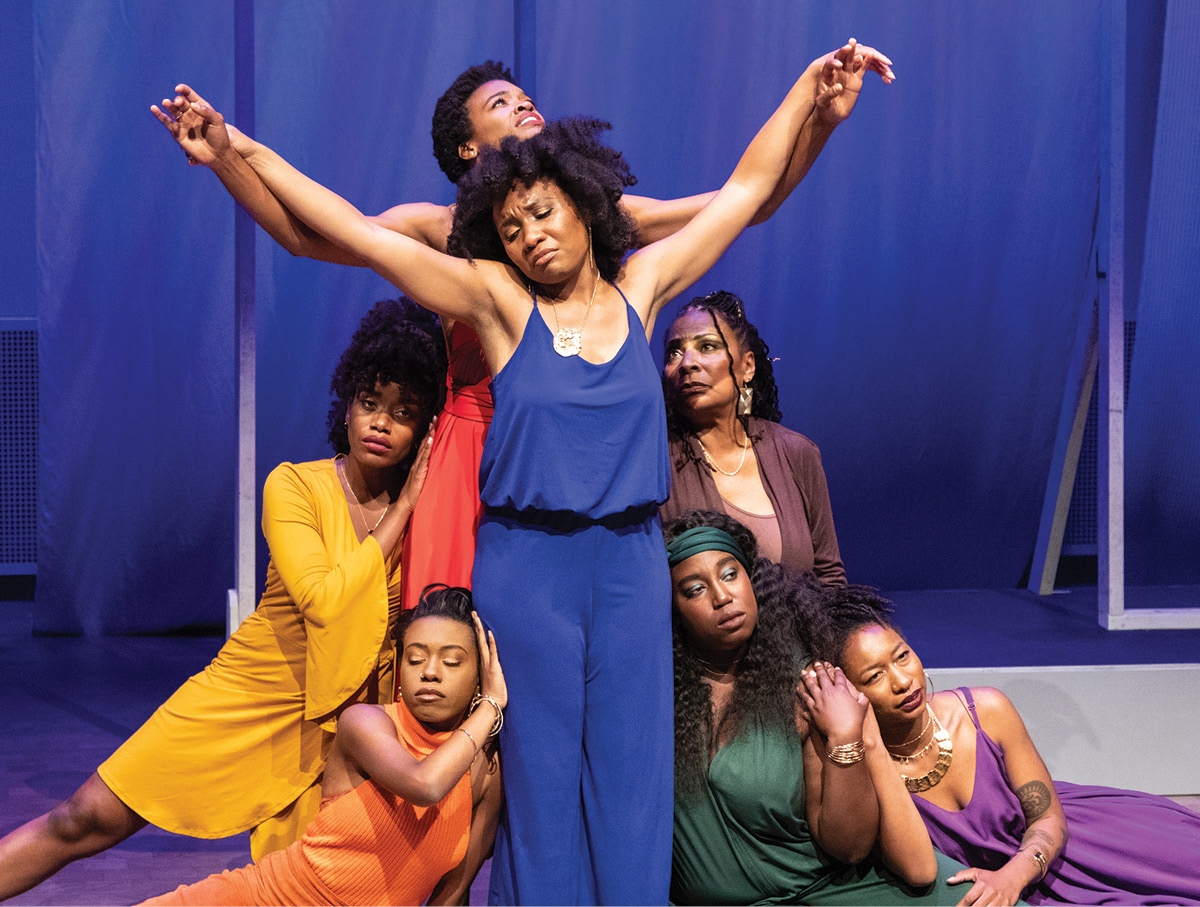
When opportunities prove elusive, go out and make your own. That was the credo that prompted Sherri Young (B.A., ’89) to found the African-American Shakespeare Company at the age of 24.
“At the time, the industry was having [conversations about] diversity, inclusion, equity,” says Young, who now serves as the organization’s executive director. “They wanted to have more black and brown people on the stage. … Plays, especially Shakespeare’s plays, were still very Eurocentric. I said, ‘The industry just doesn’t know how to use our culture as a part of the storytelling narrative.’ That was the vision of African-American Shakespeare — to give them another concept of how these works could be done that really incorporates the cultural identity of people of color within Shakespeare.”
Nearly 25 years later, the African-American Shakespeare Company has established a singular reputation for its award-winning productions of classic plays penned not only by Shakespeare but also other revered playwrights from around the world. Additionally, the company has created youth outreach initiatives designed to foster a love of theater in children from an early age. One program, Shake-It-Up, encourages African American and Latino students to become avid readers.
Young credits her undergrad days with giving her the confidence to make her ambitious vision for the company a reality. “San Francisco State made me invincible,” Young says, citing a well-rounded curriculum that included every aspect of theater production, from acting and directing to lighting, makeup and costume design. (“I was horrible at costume,” Young says with a laugh. “I don’t know if I could sew anything together.”)
The lifelong San Francisco resident also recalls theater professors Camille Cole Howard, who died in 2003, and Lynbarbra Mahler as particularly important influences. “Lynbarbra Mahler was monumental,” Young says. “The one thing I took from her was do what you want to do, say what you want to say and perform how you want to perform. Don’t try to fit another person’s mold of what you think they want.”
Forrest Gander (M.A., ’81)
was awarded the 2019 Pulitzer Prize for poetry. He won the award for his collection “Be With” (New Directions, ’18).
Suzanne Grodner (B.A., ’81)
is playing the role of Carole King’s mother in a national tour of the musical “Beautiful.”
Dan Chapman (B.A., ’84)
is the new CEO of the YMCA of San Joaquin County in Stockton.
Marcia Delgadillo (née Hoffman) (B.S., ’87)
joined Blattel Communications as marketing services director in San Francisco.
Shannon Speed (B.A., ’89)
is professor of gender studies and anthropology and director of the American Indian Studies Center at the University of California, Los Angles. Her latest book, “Incarcerated Stories: Indigenous Women Migrants and Violence in the Settler-Capitalist State,” was published by the University of North Carolina Press in October.
Tani Girton (MBA, ’90),
executive vice president and chief financial officer for Bank of Marin, received the North Bay Business Journal’s CFO Recognition Award.
Cal Orey (M.A., ’90)
continues to be a book-writing dynamo. Her latest, “The Healing Powers of Essential Oils: A Complete Guide to Nature’s Most Magical Medicine” (Citadel), will be released at the end of the year. The book is the eighth in Orey’s Healing Powers series, which has sold over half a million copies and been translated into 20 languages over the last two decades.
Elissa Auther (B.A., ’91)
has been named deputy director of curatorial affairs and William and Mildred Lasdon chief curator at New York City’s Museum of Arts and Design.
Roseann Torres (B.S., ’92),
an Oakland school board member, was appointed co-chair of the statewide “Closing the Achievement Gap” initiative.
Josie Iselin (MFA, ’94)
has a new book out: “The Curious World of Seaweed” (Heyday). The book examines 16 varieties of seaweed and kelp through prose, illustrations and photography. Iselin is also the author of “An Ocean Garden: The Secret Life of Seaweed” (Harry N. Abrams), which was featured on the cover of SF State Magazine’s Spring/Summer 2014 issue.
Barbara McVeigh (B.A., ’94)
produced the documentary “The Man Behind the White Guitar,” which explores the life of Brazilian guitarist José Neto. Kimberly Blum (B.A., ’15) contributed to the film as a photographer and filmed an interview with singer Harry Belafonte, a longtime Neto collaborator. The film made its North American debut at the California Film Institute’s Smith Rafael Film Center this summer.
Mario Robinson (B.A., ’94)
is the new varsity football coach for Carpinteria High School in Carpinteria, California.
Brian Shapiro (M.A., ’95)
has accepted an instructor position with the Communication Program at the University of Pennsylvania, Wharton School of Business. The position is in addition to his current position as affiliated faculty with the University of Pennsylvania’s Dynamics program.
Lisa Owens Viani (B.A., ’96)
has been campaigning for Assembly Bill 1788, which would ban rat poisons that have been linked to numerous mountain lion, fox and raptor deaths. Owens Viani is the founder of Raptors Are the Solution, a nonprofit that works to protect birds of prey.
Eric Monteiro (B.A., ’98)
directed the short fantasy film “Fish Hook,” which was screened as part of Washington’s Port Orchard Film Festival earlier this year.
Jason Angeles (B.S., ’99; MBA, ’09) and Justin Isip (B.A., ’14)
are co-founders of the gourmet cotton candy store Sugar & Spun. A location opened in the food court of San Francisco’s new Chase Center in September. Angeles is also the founder of FK Frozen Custard, which can be found throughout the Bay Area.
Ken Colwell (MBA, ’99)
has been named dean of the University of Houston-Victoria’s School of Business Administration.
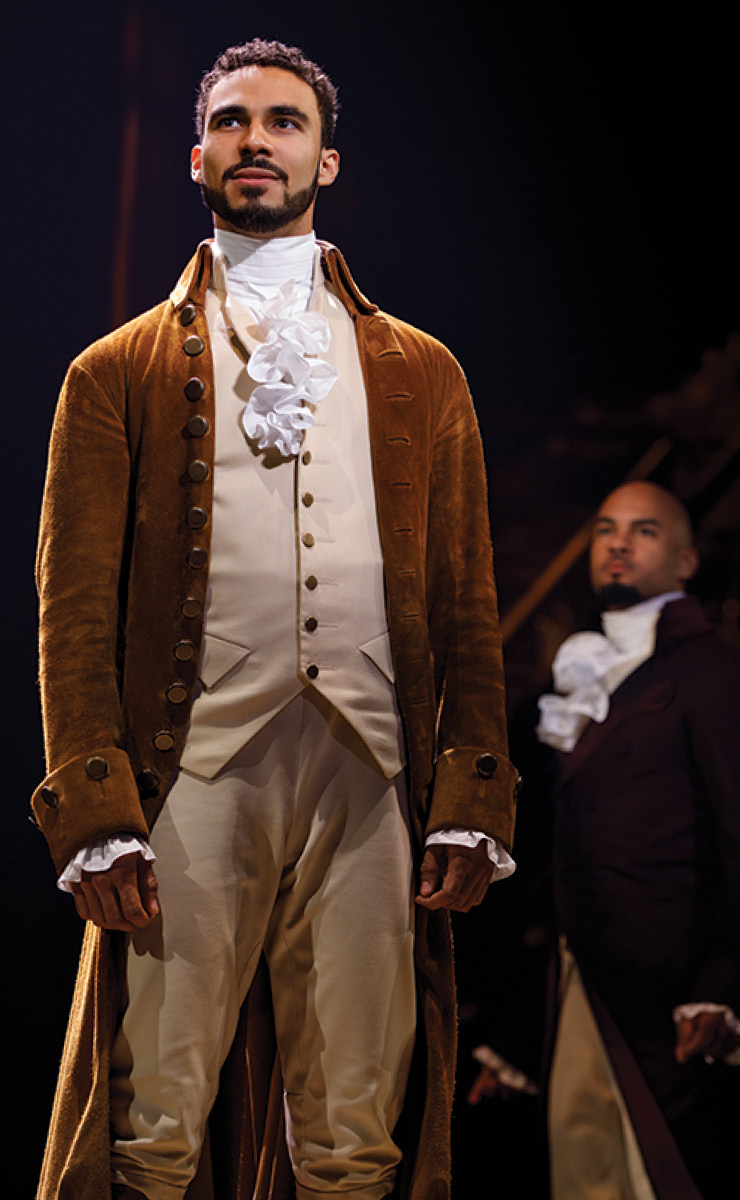
Austin Scott (B.A., ’04)
made his Broadway debut in February when he took over the title role in the mega-hit musical “Hamilton.”
Krista Niles (B.A., ’01)
leads marketing strategy as outreach and civic engagement director at the New Jersey-based Alice Paul Institute. The institute educates the public about Paul, a prominent suffrage leader and champion of the Equal Rights Amendment. Niles is also a noted photographer: In 2002, she won a Pulitzer Prize for her contributions to the New York Times’ coverage of 9/11.
Darlene Plamenco (B.A., ’02)
is the new director of sales and marketing for the Westin Verasa hotel in Napa.
Josh Hayes (B.A., ’04)
has completed work on his documentary about homelessness in America, “The Invisible Class.” Funded in part through the crowdfunding website Indiegogo, the film has been screened across the country via partnerships with homeless service organizations, schools and other community partners.
Jose Antonio Vargas (B.A., ’04)
received a very special honor recently: The Mountain View School District named a new school after him. The Pulitzer Prize-winning journalist and activist was on hand for the grand opening of Jose Antonio Vargas Elementary School this August.
Dawn Monique Williams (M.A., ’06)
was hired by Berkeley’s Aurora Theatre Company as its first-ever associate artistic director.
Olga Zilberbourg (M.A., ’06)
is the author of “Like Water and Other Stories,” released by WTAW Press in September.
Shanna Mendiola (B.A., ’08)
a meteorologist for Southern California’s KNBC, received a Los Angeles Area Emmy Award for her report “Plastic and Our Oceans.”
Krystal Reiko Hauseur (M.A., ’05)
is the author of the new book “Masking Identity: The Performance Art of Roger Shimomura” (Asian American Art Publications).
Ben Randle (B.A., ’05)
was one of 12 individuals awarded the Drama League’s prestigious Leo Shull New Musicals Directing Fellowship. As part of the fellowship, the winners attended Broadway and off-Broadway productions, met with theatre veterans and received training aimed at developing their directing skills.
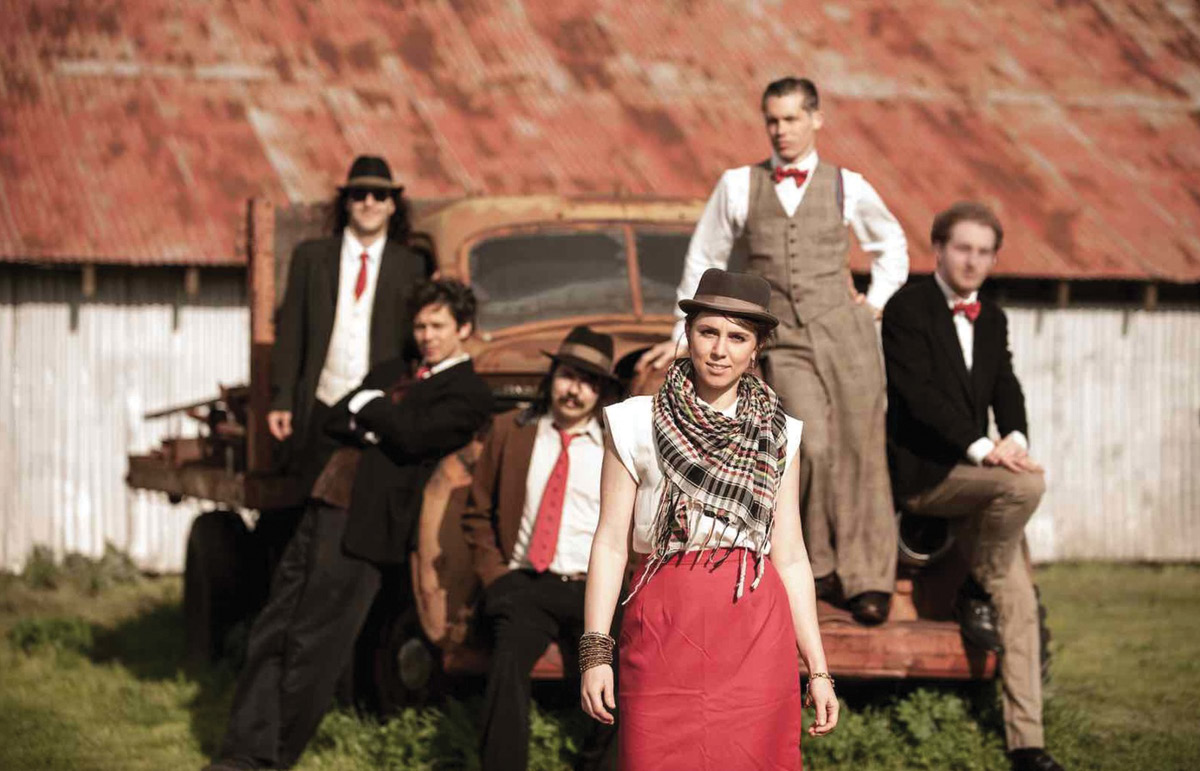
Jesse Adams (B.A., ’11) and Lauren Bjelde (B.A., ’13)
are both members of the band Royal Jelly Jive, which has been touring extensively this year. The band’s newest album, “Limited Preserve No. 3,” was released earlier this year.
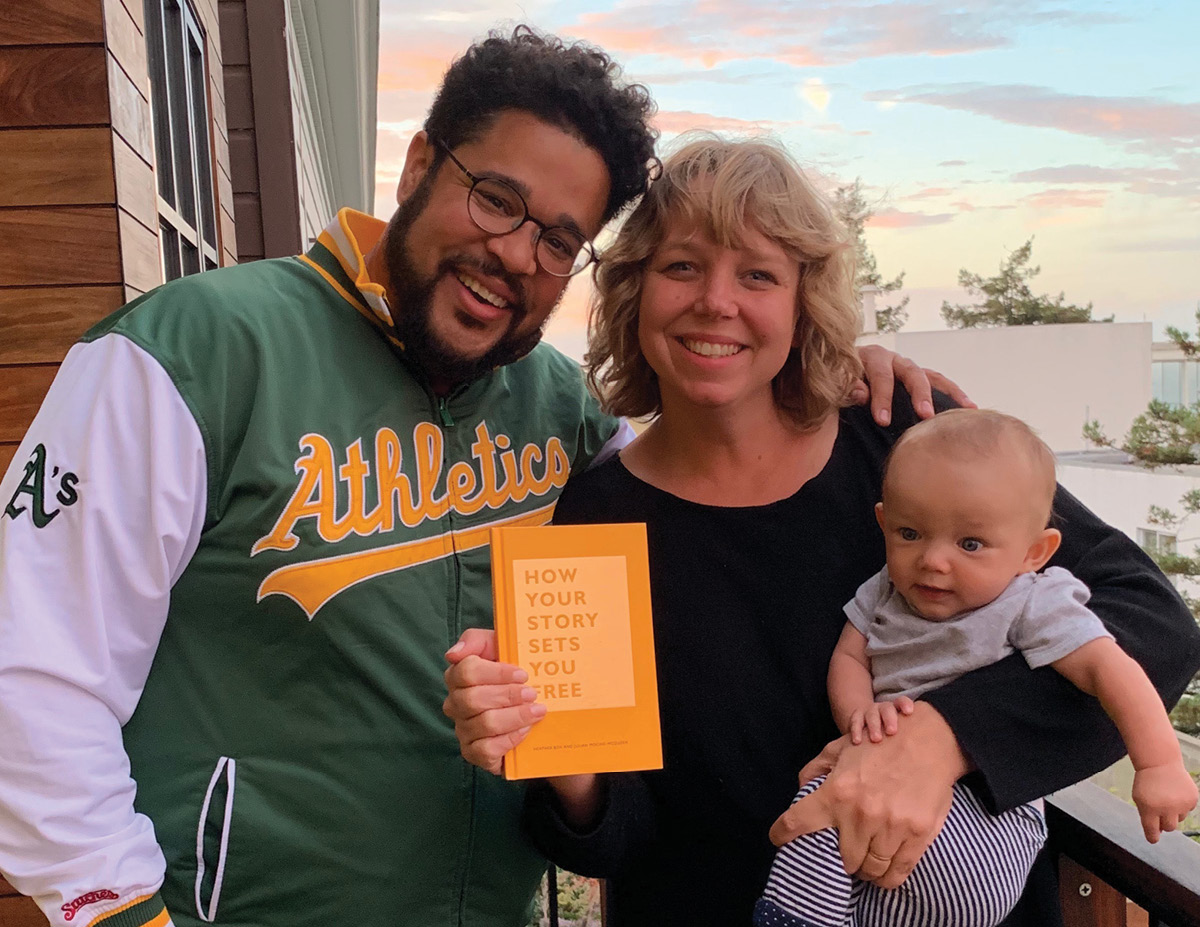
Julian Mocine-McQueen (B.A., ’13)
and his partner, Heather Box, are the authors of “How Your Story Sets You Free” (Chronicle Books, ’19). The book explores techniques for connecting with audiences. Mocine-McQueen and Box have conducted trainings with hundreds of people from around the world through their company the Million Person Project, which aims to improve the world by teaching activists storytelling techniques.
Alexis Montevirgen (EDD, ’10)
leads marketing strategy as outreach and civic engagement director at the New Jersey-based Alice Paul Institute. The institute educates the public about Paul, a prominent suffrage leader and champion of the Equal Rights Amendment. Niles is also a noted photographer: In 2002, she won a Pulitzer Prize for her contributions to the New York Times’ coverage of 9/11.
Daniella Ruiz (B.A., ’10)
is the new director of sales and marketing for the Westin Verasa hotel in Napa.
Ashley Larson (M.A., ’11)
has completed work on his documentary about homelessness in America, “The Invisible Class.” Funded in part through the crowdfunding website Indiegogo, the film has been screened across the country via partnerships with homeless service organizations, schools and other community partners.
David Carnahan (MPA, ’12)
was appointed city clerk for the city of Sunnyvale, California.
Marlena del Hierro (M.A., ’12)
was featured in a bestcolleges.com article exploring how to launch a career in gerontology. She is a founding member and operations manager at Seniorly Inc., a national senior living marketplace.
Jennifer Takahashi (B.S., ’13)
opened the Grateful Dandelion Atelier, a children’s art and yoga studio, in Pacific Beach, California.
Jonathan Spector (MFA, ’14)
is the author of the play “Eureka Day,” which was performed by New York City’s Colt Coeur theater company this summer. The New York Times called the play a “lively portrait of a debate over mandatory vaccinations” and “the perfect play for our age of disagreement.”
Kayla Mulholland (B.A., ’15)
is the director of “Platicas,” a short film exploring the perspectives of young immigrants to the U.S. The film was one of 15 selected for screening as part of the San Diego Latino Film Festival’s Migrant Voices Film Challenge.
Jason Newman (B.S., ’17)
has been working on an indie video game. A free demo of the puzzle and exploration game can be downloaded at www.akurra-game.com. A Kickstarter campaign to fund further development of the game is on the way.
Heather Richard (M.S., ’17)
was named research projects coordinator at the Shaw Institute in Blue Hill, Maine. The institute is a nonprofit devoted to exposing the effects of toxic chemical exposure and climate change.
Mahelet Gezachew (B.A., ’18)
is on her way to a successful career in the film industry. Just before graduating, Gezachew, who majored in Communication Studies and minored in Africana Studies, was accepted into the internship program of the Evolve Entertainment Fund, an initiative founded by Los Angeles Mayor Eric Garcetti and Director Ava Duvernay to provide young Angelenos access and resources into the show business. She was offered a position with the production company Anonymous Content as an activism intern, and after four months she narrowed her interests to film and television development and landed a position as a development intern with Hello Sunshine, Reese Witherspoon's anchored media brand dedicated to female authorships across all storytelling platforms. She then served as an executive assistant at the Walt Disney Company in Marketing Partnerships.
Worlds out of time still exist.
Worlds of achievement out of mind and rememberingjust as the poem lasts.
In the concert of being present.
— from “Arriving” by Linda Gregg
Linda Gregg (M.A., ’75)
published her first book of poetry, “Too Bright to See,” a few years after earning her master’s in creative writing at SF State. Six more acclaimed volumes followed, earning her such honors as a Guggenheim Fellowship, the Poets & Writers Jackson Poetry Prize and several Pushcart Prizes.
Carol Morgan Severin (M.S., ’61)
taught in SF State’s Department of Recreation, Parks & Tourism for 42 years. A firm believer in experiential education, she led student travel groups to such faraway locations as the ski slopes of the Chamonix Valley in France. After retiring from the University Severin served on the East Bay Regional Park District’s Board of Directors for 20 years, focusing much of her energy on expanding recreation opportunities and park access to young people, seniors and underrepresented populations.
David Fechheimer (B.A., ’67)
was a student at SF State when he read the book that would change his life: Dashiell Hammett’s hardboiled classic “The Maltese Falcon.” He read it in one sitting, then went to the nearest office of the Pinkerton National Detective Agency and asked for a job. He got one. A few years later he opened his own detective agency and went on to become one of the nation’s most well-known private eyes, with such famous (and infamous) clients as Martha Stewart, Roman Polanski, the Symbionese Liberation Army and American Taliban fighter John Walker Lindh.
Marvin Oliver (B.A., ’71)
was an artist, teacher and activist. His wood, metal and glass sculptures and installations often explored his Quinault/Isleta Puebla heritage. They can be found in museums, schools, hospitals and other public places around the world.
Steefenie Wicks (B.A., ’80)
was a board member and docent for the Sausalito Historical Society for many years, crusading to preserve local maritime history. A beloved local character, she was known for her feisty personality, her encyclopedic knowledge of the Sausalito houseboat community and her constant companion, a Chihuahua named Shorty.
Ed Arnow (MBA, ’83)
died in April at the age of 95. Over the course of his decades-long career in Bay Area broadcasting, he worked as a reporter and on-air personality for KNBC, KPIX, KGO and KRON.
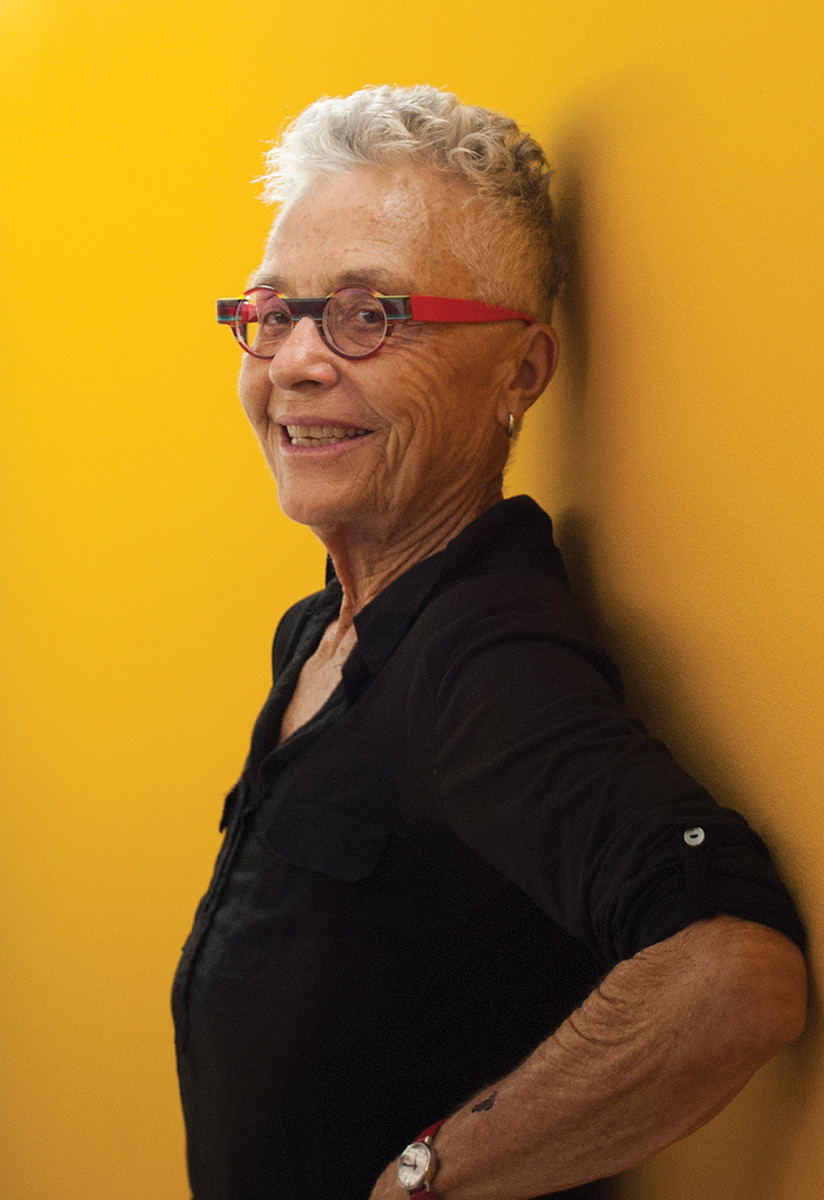
Barbara Hammer (M.A., ’76)
passed away in March after a long battle with ovarian cancer. A pioneering experimental filmmaker and feminist, Hammer (left) used her art to explore such once-taboo topics as lesbian sexuality, female orgasms and menstruation. In recent years, her work took an unflinching look at aging and illness. In a Washington Post obituary, a Tate Modern museum curator called her “arguably the first openly lesbian filmmaker” and “fearless.” She was 79.
Leonard McNeil (M.A., ’12)
already had years of experience in public service before coming to SF State to earn his master’s degree in political science: He’d been a longtime San Pablo City Council member and was elected the city’s first African American mayor in 1992. In later years he put his firsthand knowledge to use by teaching a U.S. government course at Contra Costa College.